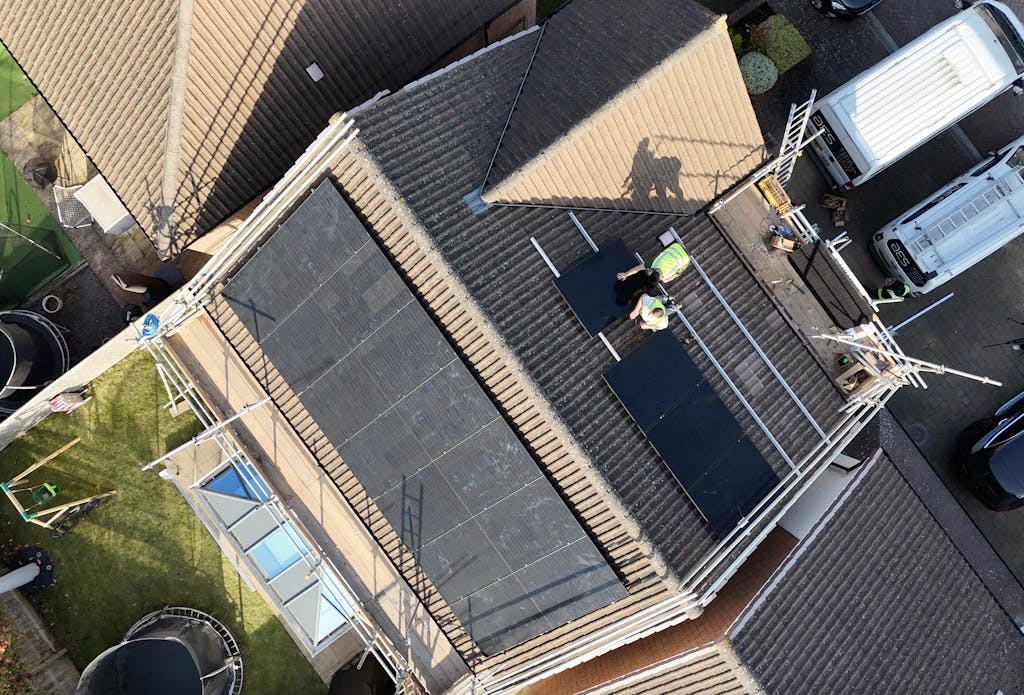Our accreditations
We break down why solar accreditations are important, which ones matter the most, and why Sunsave's accreditations benefit you.
Written byCharlie Clissitt

Calculate savings
What kind of home do you live in?
Calculate savings
What kind of home do you live in?
If you’ve spent a while researching solar panels in the UK, you’ve probably seen dozens of installers’ websites emblazoned with various badges and seals of approval. Acronyms, logos, ticks and medals - it’s enough to make the head spin.
Naturally, installers are very proud of their industry accreditations. We get it - so are we.
But what do they all mean? In this article, we run through why accreditations are so important when you’re choosing a solar installer, and which ones are the most crucial.
We’ll also explore each of Sunsave’s accreditations and why they should matter to you.
And if you’re wondering how much you could save with a solar & battery system, enter your details below and we’ll provide an estimate.
Find out how much you can save
What kind of home do you live in?
Why do solar accreditations matter?
If you’re thinking of putting solar panels on your roof, this is not the time to be taking any risks. You may find installers without many accreditations offering to fit your system for a very low price, but the sweetness of that early saving may quickly turn sour.
Solar & battery systems are a long-term investment, designed to reduce your energy bills and future-proof your property.
But if your system consists of cheap hardware, it’s fitted by slapdash installers, or you’re given misleading forecasts, then you’ll have some big disappointments in store.
That’s why it’s vital to choose an installer that’s gone to the effort and expense of securing industry seals of approval, because it’s evidence that they won’t cut any corners.
At the very least, make sure your installer is accredited by either Microgeneration Certificate Scheme (MCS) or Flexi-Orb, as this means they’ll be sticking to best-practise installation standards.
And it’ll also mean you can earn export income, which has become a huge part of saving with solar.
Let’s dig into the details.
Our accreditations: at a glance
| Accreditation | Date acquired by Sunsave |
|---|---|
| MCS | 16th November 2022 |
| Flexi-Orb | 24th November 2024 |
| Which? Trusted Trader | 4th September 2023 |
| EPVS | 25th November 2022 |
| RECC | 21st January 2026 |
| TrustMark | 16th November 2022 | NAPIT | 31st May 2022 |
1. MCS
Date accredited: 16th November 2022
MCS is a very respected name in the solar industry, open to installers across the entirety of the UK.
It started life as a government-backed initiative in 2007 - setting up just in time for the residential solar boom in the early 2010s - but became independent in 2018. As of November 2025, the scheme has certified more than 1.5 million domestic solar panel installations.
MCS’s standards define both how renewable energy technologies should be designed and installed, setting an industry-wide benchmark for quality. So not only does it keep a list of accredited solar panel installers (over 4,200), but it also has a directory of approved solar panels (almost 3,500).
That means that if you choose an MCS-accredited installer, you’ll be getting safe and efficient hardware that’s installed to high standards.
An MCS certificate is also one of the ways you can get access to solar export tariffs, which pay you for any excess solar energy you export to the grid.
As stated on the UK government website: “You need to show that your installation and installer are certified through the Microgeneration Certification Scheme (MCS) - or a scheme accredited as equivalent, such as the Flexi-Orb renewables scheme.”
Last but not least, every MCS-accredited installer must also be a member of a Consumer Code - either HIES or RECC - which requires them to provide an insurance-backed guarantee. This means you’ll get a workmanship warranty of at least two years, and it will still be honoured even if your installer goes bust.
But we go much further than this; the Sunsave Guarantee lasts 20 years, and is built to be reliable.

2. Flexi-Orb
Date accredited: 24th November 2024
Like MCS, Flexi-Orb is another UK-wide standards scheme for renewable technology products and installation - except it’s a lot younger, having been founded in 2024. It also has a much more sci-fi-style name, which is great if you’re into that kind of thing.
Until recently, an MCS certificate was the only way a homeowner with solar panels could access any export tariffs, but as previously stated, the eligibility criteria has now expanded to include Flexi-Orb.
Any installer accredited by Flexi-Orb is held to very high standards, including the use of scheme-approved hardware and top-tier installation practises, and they must ensure that an insurance-backed guarantee is in place for every customer.
You’ll also find that most mortgage providers won’t want to lend against a property with solar panels unless the system is certified by MCS or Flexi-Orb.
However, there are also a few ways in which Flexi-Orb edges ahead of MCS. First and foremost, Flexi-Orb installers use the System Advisor Model (SAM) when giving you a quote, to project your solar panel system’s performance and the financial benefits you’ll enjoy as a result.
SAM is the best system in the field, as it uses more realistic battery modelling and more precise solar irradiance than MCS, so this should result in a better representation of what your savings will be.
Flexi-Orb has also reached the top tier as a standards body, as proven by the fact that it achieved ISO/IEC 17067:2013 recognition from the International Organisation for Standardisation (ISO).
This collection of numbers and letters is a set of guidelines that forms the gold standard for certification schemes. Getting this recognition means undergoing an extremely challenging process that can take years, and Flexi-Orb is the first renewables certification scheme to get to this level.
Click here to learn more about Sunsave’s Flexi-Orb accreditation.
3. EPVS
Date accredited: 25th November 2022
Energy Performance Validation Scheme (EPVS) was established in 2016 by Certi-fi, the same company behind Flexi-Orb.
If you’re receiving energy bill savings estimates from solar installers, the seal of approval by EPVS provides peace of mind that these figures are fair and realistic.
The scheme was set up in response to increased reports of misleading performance estimates given to consumers by renewable energy technology installers, which were causing lots of finance lenders to withdraw from the market.
In their own words, EPVS “makes sure that the performance and financial estimates made by your installer are realistic, accurate, and achievable — helping you make informed, secure, and trustworthy choices.”
To achieve this, it has formed robust industry-approved methodologies for calculating energy generation and savings that all members must abide by.
Every installer must go through a very rigorous assessment procedure before joining EPVS, and all members are monitored on an ongoing basis. The proposals we generate for our customers are checked by EPVS to ensure they meet their high standards.
This means that our customers always see realistic forecasts when we show them what their system might generate, and how much it could save them. No wild projections, flimsy calculations, or misleading information.
And we’ve gone the extra mile to secure an EPVS Gold rating, which means we’re best in class for the accuracy of our savings calculations.

4. Which? Trusted Trader
Date accredited: 4th September 2023
Which? Trusted Traders is a scheme established by Which? magazine in 2013, designed to spotlight the very best installers and tradespeople across the UK.
It may have started out as just a product review magazine in 1957, but over the years Which? has evolved into a hugely influential, independent consumer champion that offers a massive range of services.
It now has a reputation as a truly authoritative, principled voice for British consumers, conducting tests on over 3,600 products each year and providing expert advice guides.
Naturally, Which? Trusted Traders is an elite club, and every applicant has to undergo thorough evaluation by independent experts.
Which? works to ensure all its approved traders are financially healthy, carry out their jobs to a high standard, value their customers’ needs, and have a sound business plan and structure.
After becoming a Trusted Trader, companies – including us – have to sign up to the Which? Code of Conduct, a comprehensive list of best practices and procedures. The Code covers issues including a trader’s conduct, quotations, contracts, insurance, goods, payment process, guarantees, warranties, and the way they handle complaints.
We currently have a score of 4.9* on our Trusted Trader profile, which is based on reviews that are 100% verified, having all been through a stringent moderation process.
In fact, we won Trusted Trader of the Month in November 2025, with the judges being impressed by our “exceptional customer service, long-term support and dedication to making sustainable energy accessible”.
Click here to learn more about Sunsave’s endorsement as a Trusted Trader.
5. RECC
Date accredited: 21st January 2026
Established in 2006, the Renewable Energy Consumer Code (RECC) is a consumer protection body covering households that get a renewable energy system.
As one of two renewable Consumer Codes approved by the Chartered Trading Standards Institute, it’s a set of standards that ensures companies serve their customers properly.
It also carries weight in the industry: more than 5,500 businesses are signed up to RECC, as of January 2026.
RECC is one of the several Code Sponsors that make up the government-backed Approved Code Scheme, which is designed to provide additional layers of protection for the consumer. Impressively, these extra protections “exceed those included in UK law”.
Every installer accredited by RECC has agreed to a list of measures that ensure the fair treatment of all their customers, including crystal-clear information, no pressure selling, simple contracts, easy complaints procedures, an insurance-backed guarantee, and access to an independent dispute resolution process.
If you hire a RECC-approved installer, you’ll also get deposit protection insurance for a period of 120 days from the date the contract is signed. You can extend this policy when necessary.
6. NAPIT
Date accredited: 31st May 2022
The National Association of Professional Inspectors and Testers (NAPIT) began life in 1992, growing to become one of the country’s largest government-approved certification bodies in the building services and fabric sector.
All of NAPIT’s 20,000+ members have proven that they’re able to complete work safely and to legally required standards, and they’re all required to hold valid insurances.
However, the major benefit of choosing a NAPIT-accredited solar installer is the fact that they can self-certify their electrical work.
Building regulations in England and Wales require certain types of work to be ‘notified as compliant’ either by Building Control or self-certification from a Competent Person. And as NAPIT is a Competent Person Scheme (CPS), this means that all members can give their installations the big green tick.
Without this, homeowners would have to spend their own time and money dealing with Building Control.
The folks at NAPIT treat the safety of you and your household as the number one priority, and expect the same from all their members.
7. TrustMark
Date accredited: 16th November 2022
Trustmark is the only UK Government-Endorsed Quality Scheme for work carried out “in and around the home”.
Since its founding in 2005, the scheme has worked to improve industry standards and enhance the protection homeowners get when having work done.
There are now around 18,000 Trustmark Registered Businesses, who all have a commitment to delivering high quality work with exceptional levels of technical competence and customer service.
Each member is also inspected by a qualified, independent assessor every three years, to ensure that it hasn’t fallen foul of the Trustmark Code of Conduct.
Summary
We’re on a mission to make the power of solar accessible to all UK households.
But we can’t do this without best-in-class installation standards, top-tier kit, honest communication, and outstanding customer service.
And our suite of accreditations is an important way of giving our customers the confidence to choose us.
Hopefully we’ve shed some light on what they all mean, and how they’ll actually benefit you.
To find out how much you could save with a solar & battery system, pop your details below and we’ll provide an estimate.
Find out how much you can save
What kind of home do you live in?

Written byCharlie Clissitt
Born in Yorkshire and now living in London, Charlie has been in the renewable energy industry since 2017, having worked as a writer and then editor of green technology advisor The Eco Experts. His work has focussed on educating UK homeowners about a wide range of residential power and heating solutions, including solar panels, storage batteries, heat pumps, infrared panels, and EV chargers.